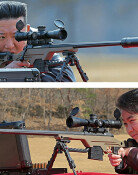Ex-GNP Chief Blasts Government Excess
Ex-GNP Chief Blasts Government Excess
Posted December. 14, 2006 07:22,
Former Grand National Party leader Park Geun-hye said on December 13, The next government should be a small government through resumption of halted privatization projects, and after a close review, unnecessary large-scale national projects should be stopped.
Park pointed out during the exclusive interview with this newspaper, At a time when the Korean people are tightening their belts and companies are streamlining through structure reforms to survive fierce competition, only the government is getting bigger now.
Park said, Ive strongly argued for the concept of small government, big market. and emphasized, If unnecessary costs are removed through intensive structure reform in the public sector, we can gain much-needed financial resources to address the growing gap between the rich and the poor and to help SMEs in financial difficulties.
When asked, Are you going to streamline the government organization as well, if it is deemed necessary? she answered, I am thinking about it.
With regard to education policy, Park singled out dumbing down of Korean student, government-dictated education and too much of political ideology as three factors that should be removed. And she said, It is necessary to allow financially independent private high schools and various special high schools to be freely set up, and the school information should be disclosed as much as possible to help students choose school while triggering competition among schools at the same time.
To question of If you takes the presidency, will you continue to pursue and build on the current government policy of building Multifunctional Administrative City, Innovative Cities (including transfer of public institutions) and Business Cities? she replied that building Multifunctional Administrative City was the promise with the Korean public and since the compensation for land had already been provided, the plan should proceed without disruption in a way that can contribute to the national development.
Park also said, Building Innovative cities was also part of the promise and therefore the plan should proceed as well. However, since building Business Cities has no point if no companies want to move into those cities, it is necessary to look into the reason behinds the current slow progress and ensure those cities to play their due role in the future.
Park said, The lesson that can be learned from the failure of the current governments real estate policy is that imposing heavier taxes and regulation alone cannot possibly bring stability to the real estate market. and emphasized, What is needed now is to increase supply of houses by raising floor area ratios and easing regulations on redevelopment, while providing plenty of houses that the public wants to live in and developing new cities. With regard to revision of the constitution, she said as premise, I am against revising the constitution ahead of the presidential election due to the possibility that the voice of the public may be drowned out by party politics for the presidential election. and expressed her thought, saying, The constitution can be revised in the next government after the national consensus is formed when the presidential candidates present their views on constitutional amendments during the election campaign. And she added, Personally I support a system where the presidential term is four years and reelection is allowed. Because when the presidential term ends and starts at the same year as that of members of National Assembly, we can save a lot of time and energy wasted on the frequent elections, so I think such a new system is desirable.
As for the issue of North Koreas nuclear program, Park said, To resolve the issue, the government should do two things. It should make its stance clear that North Koreas nuclear development cannot be tolerated under any circumstances not only in words but also in action, while pursuing both negotiation and sanctions. Through international cooperation and coordination, the government also has to let North Korea realize the possible incentives coming from abandoning its nuclear program and the dire consequences of developing nuclear weapons.
jkmas@donga.com taylor55@donga.com







